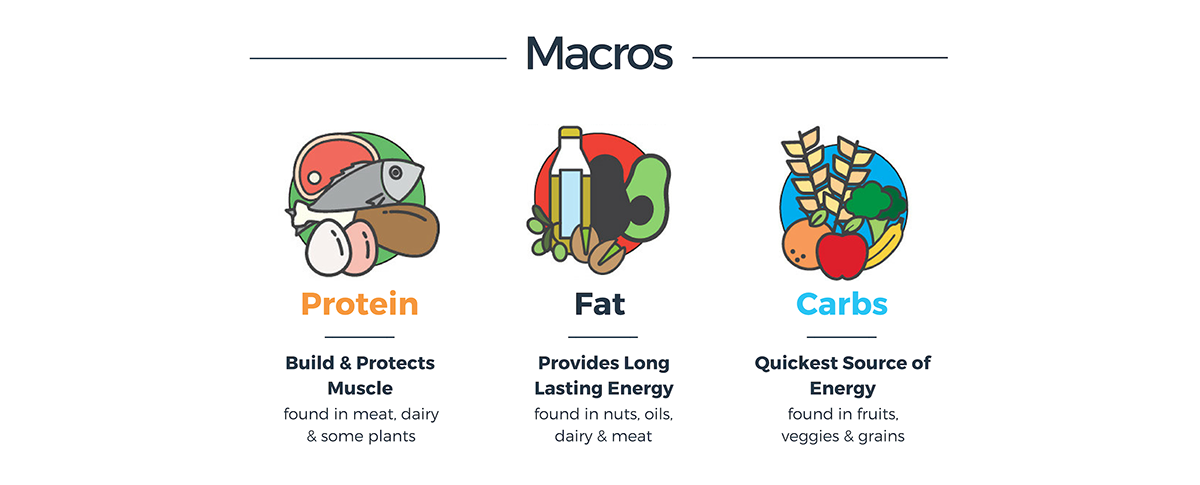Counting calories and eating for weight loss is one thing, but what about basic nutrition?
Your overall nutrition is not only important for health but can also impact how successful you are on any diet. And not getting the right amount or adequate amounts can lead to everything from poor energy and performance to chronic disease and serious health conditions.
Keep reading to get to know the basics of how your body ticks and where to get everything you need to live a healthy lifestyle, regardless of what meal plan or diet approach you are taking.
Nutrition 101
Getting good nutrition is essentially the act of supplying your body with the necessary nutrients you need to thrive. And nutrients are classified into two categories, based on the amount required by our bodies: macronutrients and micronutrients.
Both groups of nutrients provide all of the necessary elements to promote our bodies’ growth and development and to regulate our bodies’ processes. However, since everyone's body is different, it's important to know what the right balance between these nutrients are for your body and for your specific goals.
Macronutrients
In the simplest form, macronutrients are the elements in food needed for a person to grow and function. They are needed in large quantities in comparison to other nutrients which is why they are called “macro” nutrients and are commonly referred to as "macros".
Macros provide all of the calories you get from food and beverages - nutrition facts labels actually use macros grams to calculate how many calories are in the food.
Generally, macronutrients are broken into three groups: carbohydrates, protein, and fat. Alcohol is also considered a macro because it provides calories, but it is not considered an important source of nutrition, so it is often left out when counting macros.
Each macro provides a different calorie amount per gram:
- 4 calories per gram of protein
- 4 calories per gram of carb
- 9 calories per gram of fat
And even though all macros provide valuable energy, each macro has a different function in your body.
Because macros are essentially your calories organized into key groups, learning how to balance and track your macros is a popular approach to weight loss and better fitness results.

Carbohydrates
We use carbohydrates for quick energy - they are your body's favorite source of fuel because it doesn't take a lot of work to get energy from carbs. Our bodies easily break down this macronutrient into glucose (sugar) which is the same type of sugar found in your blood.
Our brains and muscles are the biggest users of glucose, but all cells in our bodies use it to function. But the number of carbs you need each day can differ from one person to the next based on activity level, weight, muscle mass, overall health, etc.
However, carbs are not essential for survival. Your body has a work-around when carbs are not present for extended periods of time, or possibly forever, using fat and protein instead. This is how the keto diet works!
In addition, not all carbs are created equal. Carbs come from all plant-based foods and some dairy, but they can also come directly from added sugar and many processed, unhealthy foods.
Because carbs are so easy to get into the diet, they can tend to get a bad rap. But choosing more wholesome sources including whole grains, fruits and vegetables, and beans, can improve your overall nutrition and allow you to still be successful in losing weight.
Sugar
All carbs are technically a type of sugar, but not all of them act the same way when it comes to your health. Naturally occurring sugar - like the kind found in fruits, milk and legumes, is often confused with added sugar.
Sugar from whole foods tend to be combined with other key nutrients and don;t always cause a spike in blood sugar. Whereas added sugar tends to be found in mostly processed foods, and when eaten alone (like in a sugar sweetened soda) can certainly impact your energy and insulin levels more drastically than other carbs.
By rule of thumb, you should aim to limit added sugars and focus on more naturally occurring sources from plant-based foods.
Starch
Starchy carbs are often referred to as "complex carbs". This type of carb takes the longest to break down, providing more sustained energy and less impact on your blood sugar levels. Common starchy foods include corn, beans, potatoes and whole grains.
Fiber
And lastly fiber! Many people don't realize that fiber is actually a type of carbohydrate. But fiber is not as easily digested, and cannot be absorbed by the body, making it significantly different than other carb types. There are two main types of fiber, soluble fiber that helps draw water into your gut, aiding in feelings of fullness and promoting heart health (as it draws water in, it can also grab cholesterol among other things with it). And insoluble fiber that sort of pushes everything through, supporting digestion and regularity.
The best sources of fiber include whole grains, beans, nuts, seeds, fruits and vegetables.
Protein
Protein is the "builder" macro and unlike carbs, it is essential for good nutrition. In fact, protein plays such a unique role, it is often your last resort for daily energy and instead used to build, repair and maintain your entire self.
We need protein in our diets because it provides us with essential amino acids that we cannot make ourselves. Our bodies are like recycling geniuses that can take an old pallet (plant and animal protein), break it down (into amino acids), and make a bench from the parts (new protein).
Proteins play a part in all of our bodies’ functions from our nervous system to our digestive system, and our entire body, cells, DNA, etc. is all made up of proteins.
Healthy sources include beans, nuts and seeds, lean meats, and eggs. And while animal sources of protein have the highest protein content per calorie, you can also meet your protein needs without eating animal products on a vegan or vegetarian diet.
Fat
Fats, like protein, are also an essential dietary must - they are a great long-term source of energy and also play a vital role in maintaining healthy skin and hair, insulating body organs against shock, maintaining body temperature, hormone regulation, and promoting healthy cell function.
Fat tends to get a bad rap because it is the most calorie dense macro (providing more calories per volume) and when eaten in excess it can easily stored as body fat.
But other macros can also be stored as body fat and this process requires you to eat more calories than you need - leading to weight gain. There is no need to fear fat as long as your calories are controlled and you are using an overall macro balance that works for you.
Healthy sources of fat include eggs, fatty fish, nuts and seeds, healthy oils, and avocados.
Saturated Fat
It is highly debated whether saturated fats are needed, but it is widely agreed we should not consume them in high amounts. While the research is torn over whether or not they are 100% "bad", high intakes of saturated fat has been associated with increased blood cholesterol in numerous studies and we haven't found in true health benefits of this type of fat either (1).
Saturated fats are mostly found in animal products like milk, cheese, and meats, but they are also found in smaller amounts in plant sources such as seeds and nuts, avocados, and plant oils.
Cholesterol
Cholesterol is a type of fat used to make hormones, Vitamin D, and digestive substances. But it is not necessary to consume high amounts of cholesterol because our bodies can make it from the fat we eat. Research has also indicated that dietary cholesterol may not be as strongly linked to blood cholesterol as we once though, but it is probably still good practice to avoid going overboard (2).
Major dietary sources of cholesterol include cheese, egg yolks, and fatty meats. It is not found in significant amounts in plant sources.
Micronutrients
Called “micro” nutrients because they are needed only in very small amounts, these substances to not provide any calories but enable our bodies to produce enzymes, hormones, and other substances vital to the development, disease prevention, and well-being.
Micronutrients are commonly referred to as vitamins and minerals. And it is adequate intake of these micros that help reduce your risk of chronic disease, promote a longer life and improve your overall wellbeing. Some research even indicates that higher intakes of micros is associated with improved mood, energy levels and appetite control (3,4).
There are 26 essential vitamins and minerals from food that all contribute to endless bodily functions. Which is why correcting even a minor deficiency in a micro can lead to drastic improvements in your health and day to day life.
Choose a variety of nutrient dense whole foods, like fruits, vegetables, whole grains, and lean proteins, to increase your overall intake of micros.

Getting The Right Nutrition for You
Overall, the main goal of nutrition is to connect what your eating to how it effects your body, specifically how your food is making you feel. If you want to lose weight, have more energy, gain more muscle, etc., this is the basic thing you need to understand about your diet.
Learning what good nutrition is, is a great start. And being aware of how your diet specifically effects your fitness goals and individual needs will save you a lot of unwanted stress in the long run, allowing you to take complete control over your health.
Check out our Micro & Macro friendly foods here!

